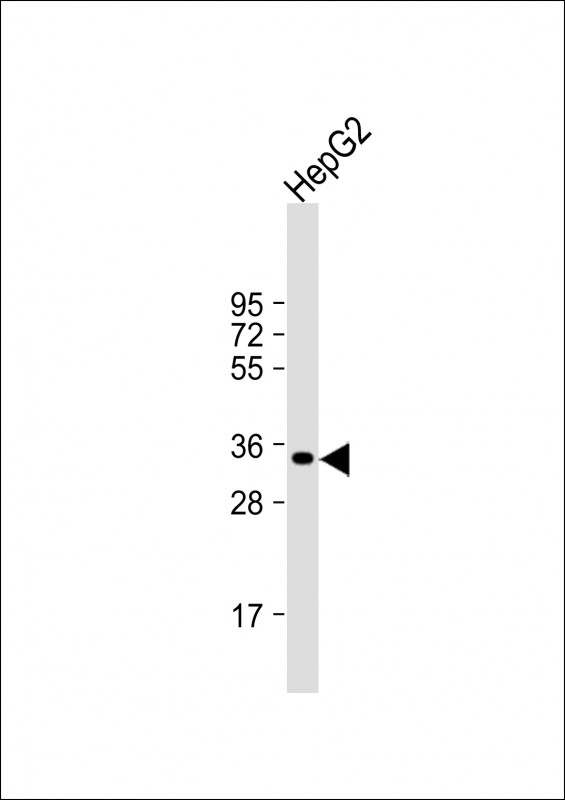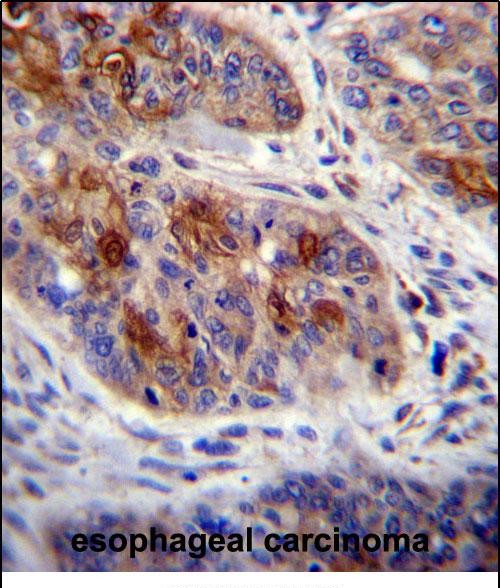

| WB | 1/1000 | Human,Mouse,Rat |
| IF | 咨询技术 | Human,Mouse,Rat |
| IHC | 1/100-1/500 | Human,Mouse,Rat |
| ICC | 技术咨询 | Human,Mouse,Rat |
| FCM | 咨询技术 | Human,Mouse,Rat |
| Elisa | 咨询技术 | Human,Mouse,Rat |
| Aliases | HCLS1-associated protein X-1, HS1-associating protein X-1, HAX-1, HS1-binding protein 1, HSP1BP-1, HAX1, HS1BP1 |
| Entrez GeneID | 10456 |
| WB Predicted band size | 31.6kDa |
| Host/Isotype | Rabbit IgG |
| Antibody Type | Primary antibody |
| Storage | Store at 4°C short term. Aliquot and store at -20°C long term. Avoid freeze/thaw cycles. |
| Species Reactivity | Human |
| Immunogen | This HAX1 antibody is generated from rabbits immunized with a KLH conjugated synthetic peptide between 161-190 amino acids from the C-terminal region of human HAX1. |
| Formulation | Purified antibody in PBS with 0.05% sodium azide. |
+ +
以下是关于HAX1抗体的3篇参考文献,涵盖其功能及在疾病研究中的应用:
1. **文献名称**:*HAX1 deficiency causes autosomal recessive severe congenital neutropenia (Kostmann disease)*
**作者**:Suzuki Y. et al.
**摘要**:该研究揭示了HAX1基因突变导致先天性中性粒细胞减少症的机制,通过HAX1抗体检测患者中性粒细胞中蛋白表达缺失,证实HAX1在细胞存活中的关键作用。
2. **文献名称**:*The anti-apoptotic HAX1 protein is a regulator of cardiac calcium handling*
**作者**:Vafiadaki E. et al.
**摘要**:研究发现HAX1通过调节心肌细胞钙离子稳态影响心脏功能,利用HAX1抗体进行免疫共沉淀实验,证实其与钙调蛋白的相互作用,提示其在心脏疾病中的潜在病理机制。
3. **文献名称**:*HAX1 enhances cell invasion and drug resistance in chronic myeloid leukemia*
**作者**:Wang Y. et al.
**摘要**:文章通过HAX1抗体介导的Western blot和免疫组化分析,证明HAX1在慢性粒细胞白血病中高表达,并与其耐药性和侵袭性增强相关,为靶向治疗提供依据。
这些文献均使用HAX1抗体进行蛋白定位、功能验证及机制研究,涉及免疫、心脏和肿瘤等领域。
The HAX1 (HS1-associated protein X-1) antibody is a tool used to study the HAX1 protein, a multifunctional molecule involved in cell survival, migration, and intracellular signaling. HAX1. encoded by the *HAX1* gene, contains nine exons and three structural domains, interacting with proteins like HCLS1 (hematopoietic cell-specific Lyn substrate 1). It localizes to mitochondria and endoplasmic reticulum, regulating mitochondrial membrane stability and apoptosis via Bcl-2 family proteins and Caspase-9 activation.
HAX1 antibodies are critical in research on severe congenital neutropenia (e.g., Kostmann syndrome), where *HAX1* mutations impair myeloid cell survival. They also help explore HAX1’s roles in cancer metastasis (via Rho GTPase/Integrin pathways) and neurodegenerative disorders like Parkinson’s disease.
As a reagent, HAX1 antibodies enable detection of HAX1 in techniques like Western blot, immunofluorescence, and immunoprecipitation. Variants (e.g., isoform-specific antibodies) aid in distinguishing HAX1’s tissue-specific functions. However, cross-reactivity with homologous proteins (e.g., HSP60) requires validation via knockout controls. Overall, HAX1 antibodies advance understanding of cellular homeostasis, disease mechanisms, and potential therapeutic targets.
×